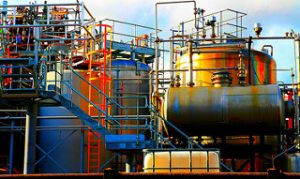Podcast: Play in new window | Download
Subscribe: Apple Podcasts | RSS
 Chris Welch joins Adam, Brian, Carmen, and Jeff to talk about the field of chemical engineering.
Chris Welch joins Adam, Brian, Carmen, and Jeff to talk about the field of chemical engineering.
- Jeff believes in unicorns, even though he’s never seen one!
- From his childhood, Jeff recalls watching a DuPont film about “Better Living Through Chemistry.”
- Our guest for this episode is Chris Welch, a chemical engineer from New Brunswick, Canada, who works in the water treatment industry.
- Branches of chemistry include (but are not limited to): physical chemistry, organic chemistry, and analytic chemistry.
- Biological scrubbing uses bacteria to remove Hydrogen Sulfide (and volatile organic compounds) from a gas stream.
- Chemical engineers concentrate on facilitating chemical reactions, thereby allowing for large scale production, while chemists focus on developing innovative materials and processes.
- In the mid-1900s, it was possible to buy kids’ chemistry sets containing cyanide, uranium, and ammonium nitrate.
- Chemical engineers sometimes make use of process simulators, such as Aspen Plus, ChemCad, and PRO/II.
- Thermal management is an important part of controlling many chemical processes.
- Plant shutdowns can be very expensive, especially when the shutdown is unexpected.
- A chemical reactor is a vessel that contains (and facilitates) a chemical reaction.
- Solids are removed from a liquid through sedimentation in a clarifier.
- In Canada, licensed engineers carry a “P.Eng.” designation.
- Our guest is a drummer in local pipe band.
- Listners can reach Chris via email: cwelch -+= at =+- unb dot ca.
Thanks to Grey World for use of the photo titled “colourful chemicals.” Opening music by John Trimble, and concluding theme by Paul Stevenson.
Great episode! I’m a chemical engineer and my husband is a materials scientist. The main difference between the two is that chemical engineers generally handle the liquids and gases and materials scientists generally handle the solids and physical material testing. Chemical engineers are much more concerned with wet chemistry and the unit operations used to scale things up than material scientists would be. Materials scientists would be much more common to find in areas like wafer fab and metallurgy.
There are areas of overlap in training (polymer chemistry and rheology, thermodynamics), but not many.